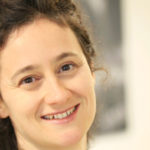Digital Equity and Individual Rights in the Age of Big Data
Speakers
-

Head of Editorial Partnerships + Special Projects, BBC World Service Group
Emily leads high profile projects across the BBC. These include Crossing Divides - a pan BBC multi-platform season about bringing people together in a fragmented world across lines of faith, politics, ethnicity, and generation as well as SoICanBreathe – a BBC News multi-platform season about tackling air pollution. She also directs the BBC Komla Dumor Award for African Journalists. Emily leads the solutions-focused journalism project at the BBC, kick-starting a culture change inside the organisation. This has been achieved via seasons, and delivering workshops from Nairobi to Delhi to Birmingham, toolkits and blogs and speaking at many events and conferences. She previously served as an award-winning broadcaster and editor at the BBC, reporting and producing for the BBC across 5 continents. Emily has been a Visiting Fellow at the Skoll Centre, Said Business School, University of Oxford, a Senior Advisor to the Skoll Foundation and has written for The Guardian, Telegraph, Independent, Economist and the FT, plus hosts panels globally. Emily is also a BBC Executive Coach, and on the board of The Wingate Foundation.
-

Jim Fruchterman, CEO, Tech Matters
Technologist for Good and Social Entrepreneur
Jim Fruchterman is a leading social entrepreneur, a MacArthur Fellow, a recipient of the Skoll Award for Social Entrepreneurship, and a Distinguished Alumnus of Caltech. His life’s work is applying technology to benefit the 95% of humanity typically neglected by for-profit tech companies.
Jim’s career started with a private enterprise rocket company. Although the rocket blew up on the launch pad, this experience launched his entrepreneurial career in Silicon Valley, where he started two successful for-profit companies in the machine learning/artificial intelligence field in the 1980s.
Jim’s first social enterprise idea was a machine that recognizes letters and words and reads those words aloud to people who are blind. He founded Benetech, now Silicon Valley’s leading nonprofit technology company, to build these reading machines, empowering people with disabilities to read independently. He continued by creating Bookshare, which is now the largest library in the world for people who are blind or dyslexic. Jim was on the original drafting team for the Treaty of Marrakesh, the first pro-consumer intellectual property treaty passed by the United Nations.
In 2019, Jim founded Tech Matters, a new nonprofit tech for good organization. Tech Matters builds the technology for social good movement, helping social and systems entrepreneurs use tech to achieve impact at scale. Its first two social enterprises are Aselo, a shared modern contact center for the child helpline movement, and Terraso, a platform to bring better tools and more funding to locally-led sustainability initiatives to respond to climate change.
Through his work with Tech Matters, Benetech and as a trailblazer in the field of social entrepreneurship, Jim continues today advancing his vision of a world in which the benefits of technology reach all of humanity, not just the wealthiest and most able five percent.
-
Data Editor, The Economist
Kenneth Cukier is the Data Editor of The Economist in London, after a decade at the paper as a business and technology writer, and foreign correspondent (most recently in Tokyo from 2007-2012). He is the co-author of the book "Big Data: A Revolution That Will Transform How We Live, Work, and Think" with Viktor Mayer-Schönberger in 2013, which was a New York Times Bestseller and translated into 20 languages. From 2002 to 2004 Mr. Cukier was a research fellow at Harvard's Kennedy School of Government. He is a member of the World Economic Forum's advisory council on data-driven development. Mr. Cukier serves on the board of directors of International Bridges to Justice, a Geneva-based NGO promoting legal rights in developing countries. Additionally, he is on the board of advisors to the Daniel Pearl Foundation. He is a member of the Council on Foreign Relations.
-
Senior Counselor, Skoll Foundation
Larry Brilliant, MD MPH: Chair, Ending Pandemics; CEO, Pandefense; former Chair, National Bio-Surveillance Advisory Subcommittee; former Prof Epidemiology, UMich, Head of Google.org, CEO Skoll Global Threats, smallpox eradication program WHO, CDC, Senior Counselor Skoll Foundation, Salesforce.org founder, Seva Foundation, co-founder The Well and author of Sometimes Brilliant and The Management of Smallpox Eradication. TIME100 and Ted Prize; multiple honorary doctorates, CNN on-air analyst @larrybrilliant. info@larrybrilliant.com
-

Chief Scientist, UN Global Pulse
Miguel is Chief Scientist at UN Global Pulse, an innovation initiative at the Executive Office of the United Nations Secretary-General, harnessing Big Data for global development. He leads the data science team across the network of Global Pulse Labs in New York, Jakarta and Kampala which provide "innovation as a service" - developing Big Data projects together with UN system partners. Miguel is the founding director of MalariaSpot.org- videogames and crowdsourcing for diagnosis of malaria and other global health diseases, based at the Universidad Politécnica de Madrid. As an antidisciplinary scientist, over the last 10 years, he has been working on innovative projects at the crossroads of international development, social innovation, global health and systems biology with data science. Miguel is Ashoka fellow (2013) and GSP10 from Singularity University at NASA. He obtained a PhD in biomedical engineering, MSc in cognitive sciences and MSc in telecommunications engineering.